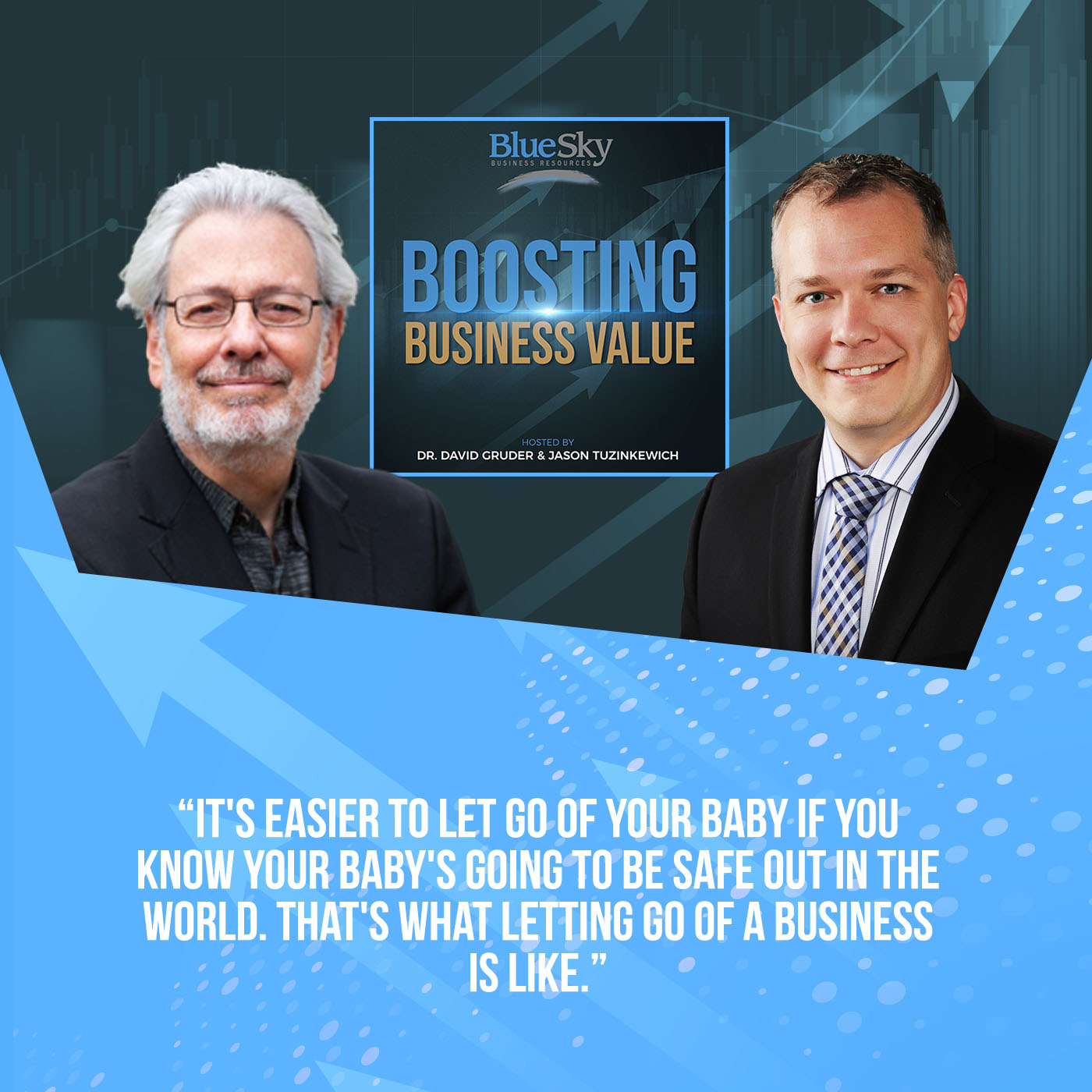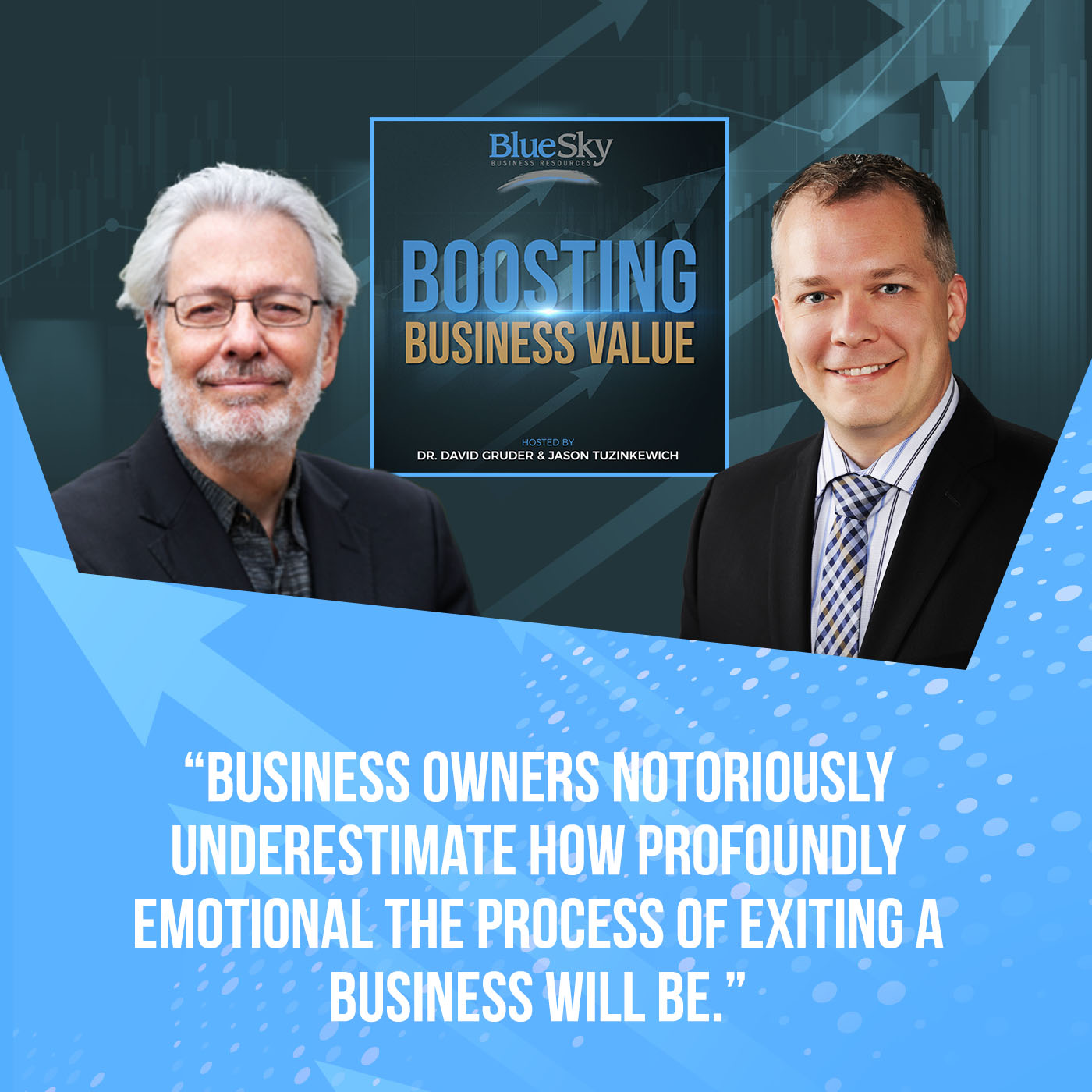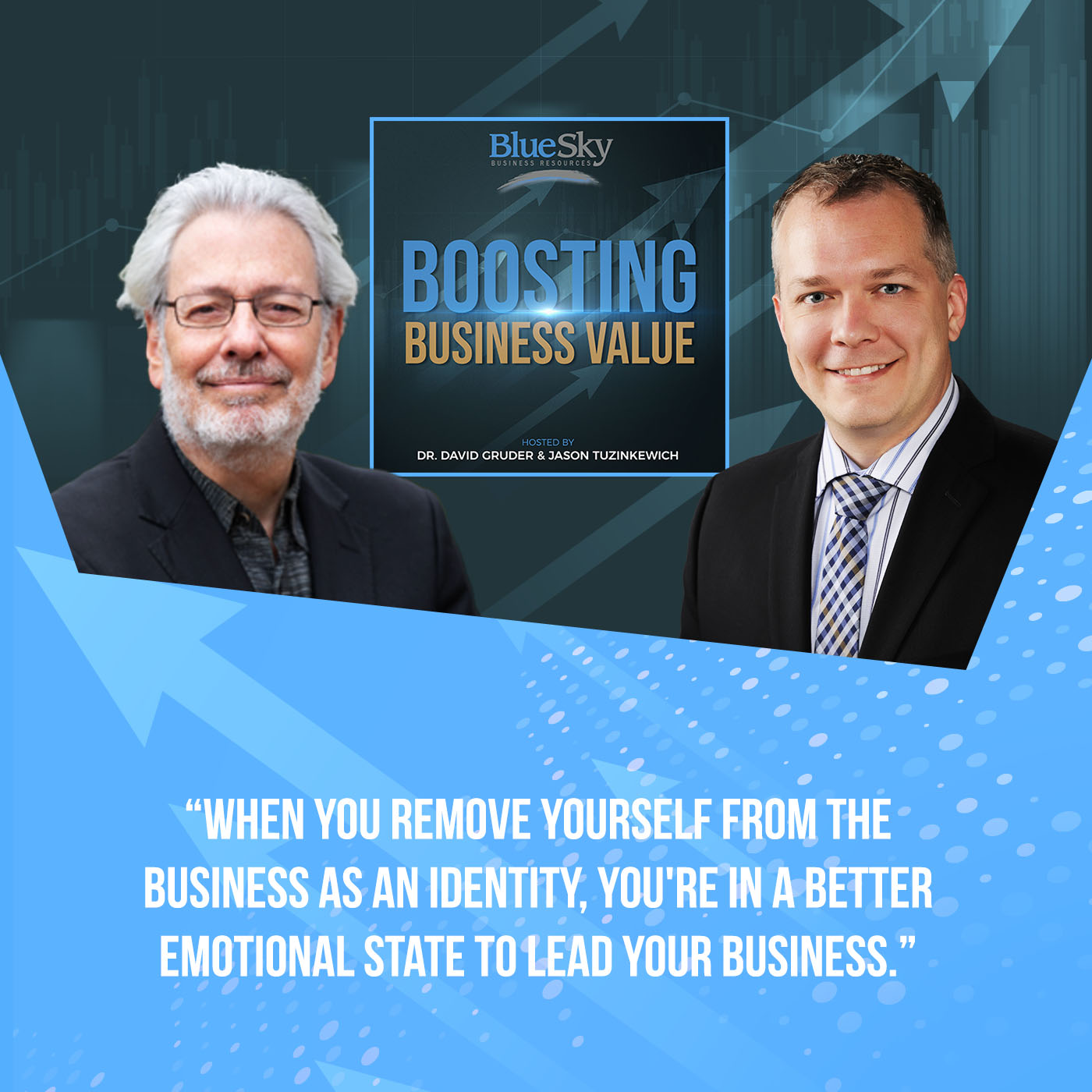Ep. 02 - Are You REALLY Ready To Be Without Your Business?

Exiting your business can be scary. You’ve built your business with blood, sweat, and tears, and now you’ve got to sell it. That is inevitable, people grow old. So the best thing you can do is to start thinking of your next life chapter. What will your legacy be onwards? In this episode, Dr. David Gruder and Jason Tuzinkewich illuminate how to realistically determine whether you're truly ready to be without your business, along with describing exactly what's involved in becoming truly ready. Take these steps to get free from subliminal resistance to exiting!
---
Watch the episode here
Listen to the podcast here
Are You REALLY Ready To Be Without Your Business?
What To Put In Place So You're Excited To Exit Into Your Next Life Chapter
In this episode, we'll illuminate practical ways to realistically determine whether you're truly ready to be without your business so you won't have subliminal resistance to exiting.
What we're going to be focusing on in this episode is some challenges about being ready to be without your business and some information on what's causing those in the success roadmap. We'll wrap up with some takeaways. We'll start with challenges. There are a few challenges we want to touch on. The first of which is identity. The thing that we virtually universally see when a business owner has gotten to the point where they're ready, or they think they're ready to exit their business, or they want to be ready to exit their business is, “Who am I without my business?”
The reason that's common is because people who have built a business from the ground up and have seen it all the way through to prosperity and to success and profitability, and to the point where they're ready to exit the business and harvest the fruits of all of those years of having built it, they have built a lot of who they think they are around the business.
It's an occupational hazard. If this is something you relate to, please, know that this is virtually universal. We inadvertently wrap parts of our identity, parts of who we think we are around our business. What should rise up when we're thinking about exiting our business is, “Who am I without my business?” That's the first identity question.
What should rise up when we're thinking about exiting our business is, “Who am I without my business?” That's the first identity question.
What accompanies that is, “What’s my next chapter? I’ve built so much of my calendar and my life energy and my time and my efforts around the business. What’s next for me? What is my purpose in a chapter that is post-business, or at least after this particular business?” Those are the two virtually universal identity challenges that people face when they’re asking themselves the question about whether they’re ready to exit their business, “Who am I without my business? What’s the next chapter?”
I love a bunch of what you said there. We could spend literally hours unpacking those three points. First and foremost, I love that you qualified ready, because when you think you’re ready, you’re just starting. Believing you’re ready versus being ready is important. This whole concept of marrying your identity with your business, that’s how entrepreneurs work. You start by doing something, recognizing a need and saying, “I can fill this need better than anybody else.” That’s why you start your business.
It's obvious to see that you're going to carry that I can do this better than anyone else vision into everything that you create your business to be. Great points. The next thing that people start to think about as they start separating themselves from their business is not only who am I and what's my next chapter, but what's my legacy with everything that I created. It's easier to let go to your baby if you know your baby's going to be safe out in the world.
That's what letting go of a business is like. It's like sending your child to college. If you know that you've done everything in your power to prepare them to be successful on their own and to carry on all of your care and teaching into the next level for themselves, then you can be excited for them. It's important that you think about the people that you're leaving behind, the business, the staff, all of these people that have become a part of your family, will they be well taken care of after you leave?

Everybody's heard horror stories of the old 1980-style private equity guy that comes in and hacks and slashes labor and guts the business from the inside out to increase profit margin before exiting and dumping a crap bomb into another buyer's hands. Fortunately, private equity has gotten a lot more sophisticated and a lot more caring in the intervening decades.
That's not as common as it once was, but it's important to know as a business owner when I let go of my business, what am I going to leave behind as a legacy for the staff, for the brand, for the products and that you nurtured into existence. How do you protect the integrity of that brand? Will that vision that you have be replaced with a different vision that you'll have regret over? Will you look back at your business and feel bad about it? Can you look at your business and feel proud as you experience your next chapter?
The only thing that I want to add by way of emphasis is that virtually everyone knows about buyer's remorse. With this, what you're talking about right now, Jason, and what we're talking about is seller's remorse. In order to be truly ready to exit a business, all of those seller’s remorse legacy dimensions have to be crystal clear inside you at a level where you look at those legacy pieces and you go, “Yes, I am not going to have remorse if this business sells in this way.”
We'll talk about this a little bit later, but when you have a good advisory team that helps you identify those things, all of a sudden, we have a crystal-clear picture of what type of buyer we're looking for. We can target and vet and only accept offers from buyers that will fit not only your financial requirements but your legacy requirements as well. It gives us the direction to go out and execute a good transaction.
There's also that financial consideration. How do you afford your next chapter? What do you need to take care of yourself and your family into retirement? Do you have college tuitions that you want to pay for? Do you have hobbies that will include significantly more expense than you've been incurring in your lifestyle? The financial piece, what do I need to exit my business comfortably, is typically the first thing people think about, but it's the last thing people can effectively answer. Making sure that we're taking care of these identity and legacy issues first will inform your financial need. Financial need is not the precedent to defining what sandbox you can live in after you exit
It's important because execution is the integration among all three of these challenges areas. When you're executing, you're integrating identity, legacy, and financial. They're not separate pieces. It's not like I'll take one from column A and one from column B. The entire picture is the interaction and the coordination among identity, legacy, and financial considerations.
Let's dig into what the typical client that we speak with doesn't know about these tops topics that cause challenges. The first thing that I like to bring up in this what you don't know about what you need to think about section is, I'm guilty of this too, but going back to the first thing that Dr. Gruder said, you've built your sense of self around a business to a far greater extreme than you recognize.
When you start to look in the mirror and say, “I'm Jason Tuzinkewich, citizen,” versus, “I'm Jason Tuzinkewich, COO of Blue Sky Business Resources.” I start seeing a different person. I have to look in the mirror first and start trying to look at myself as a citizen separate from the business before I can even explore what that means to me and what I look like after being a business owner.
The next part is that a lot of times, we find that those business owners are through the process of devoting themselves to their business. They have inadvertently disconnected from, or at least neglected other passions of theirs and perhaps also loved ones and their health in pursuit of business success. Back in the Middle Ages, when I had enough room in my schedule to include providing psychotherapy, now we're going back to the ‘80s and ‘90s, I had a lot of clients. Probably the majority of my psychotherapy clients were people who had attained more money than God or more power than God. They were highly successful people. They would end up in my therapy office in those days because, at the cost of their success, they were suffering.
What they would come in saying is the equivalent of, they never used this wording, but, “I now have more money than God or more power than God or both, but my spouse has left me. My children are no longer talking to me. My health has gone to H-E Double Hockey Sticks in a handbasket. Where did I go wrong? I did all the right things. How did this implode?” I wouldn't underestimate this.
When you're looking at exiting your business, part of what's crucial to reconnect with or discover afresh sometimes because as we age, things we're passionate about often shift, that's normal. It's crucial to connect or reconnect with our passions that we disconnected from or neglected or that we want to step into what we haven't had time to step into and to make a plan for how we're going to reconnect with our loved ones and how we're going to uplevel our health.
I'll say one last thing about this piece, which is the nightmare of the spouse, is that the spouse who exits their business or retires is now home full-time and aimless. The spouse is tearing their hair out. It's like, “Get a life for yourself. You can't suck on me endlessly. I've got a life of my own, too, in addition to our marriage.” That’s an important thing to attend to with eyes open.
The thing that accompanies all of this with all of the things we've been saying about connecting with passion or being disconnected from passion and perhaps having sacrificed some of our health, some of our loved ones and all of what we've been saying about the identity and legacy and financial issues involved is that, Jason, you know as well as I do, we see this over and over again. Business owners notoriously underestimate how profoundly emotional the process of exiting a business is going to be. We’ve now unpacked for you exactly why it’s as deeply emotional as it is.

A lot of this goes back to definitions of success. Fortunately, there is more discourse in the social commentary about defining success in a more holistic fashion. You’ve described well people who have defined success a certain way achieved to perfect measure that definition of success and found that that did not equate to happiness. It’s funny, as you’re describing this, I think about if you were to ask most of my friends what my hobby was, they’d probably say spreadsheets and analytics.
I would say that for you.
I probably would, too. I’d like to pretend that it’s tongue-in-cheek, but it’s true. I’m thinking, “How’s that going to translate to my retirement community? What am I going to contribute? I’ll go around and make spreadsheets for everybody?”
No, you’ll make a spreadsheet that identifies all of the things you’re going to do with your retirement.
I look forward to that. It’s all how you encapsulate your perspective of successful living. When you’re not ready for big emotion, when big emotion takes you by surprise, it can be disastrous. We’ve seen big emotion during sell side M&A transactions come out in horrible ways. The worst possible way is blowing up a good transaction and getting stuck with the business after you’ve convinced yourself you’re leaving or leaving a lot of the money you needed on the table. It comes out in other ways, too.
It ’omes out into sideways negative conversations with loved ones. It comes out in detrimental or destructive personal behavior. It comes out in all these wrong ways when you’re surprised by it. When you’re prepared for it, you have that perspective and that ability to step back and say, “This is one of those big emotions that I’m feeling. I have a support network and a plan for how I’m going to deal with it.”
It becomes a healthy process instead of these destructive explosions. In all of that, I also think about the fact that throughout our entire life, we've learned a mantra. That is if we know it's going to hurt, tear the Band-Aid off. Once we know this is going to be emotional and hard, we want to get it over as quickly as possible.
I've got bad news for you. The typical M&A process averages nine months when it's run by a qualified transaction advisor. In climates like we have right now where interest rates are a little bit higher, banks are nervous about a correction, all of those things, that process slows down even more because everybody gets more careful.
If you’re thinking, “I've accepted that this is going to be emotional and cumbersome. I've accepted that I have to redefine myself. I want to get out now,” then we got to take a step back and recalibrate our expectations and plan for a twelve-month marathon and be prepared for that. If you're not prepared for that, every single month that this process takes is a month that you're going to be self-destructing and that you're going to be making bad decisions for your business that will hurt your ability to exit.
That twelve-month marathon is likely to only be twelve months if you're starting the clock after your business's ready to be sold.
Thanks for clarifying that.
As you were talking, Jason, what I was reminded of was the adult version of something that has been often said on children's shows, “Don't try this at home, kids.” The adult business owner version of that is, don't try to exit by yourself, even though a lot of what got you into your business was your ability to do things on your own. This is not the time in a business's lifespan to do it on your own. What we're going to step into next is to outline a success roadmap and what to look for in a solution that's going to enable you to exit as rapidly, as feasible, and as wholehearted away as you're capable.
Don't try to exit by yourself, even though a lot of what got you into your business was your ability to do things on your own.
One of the prevailing themes that you'll read David and I talk about almost every single episode is that entrepreneurs have a, “I can do it better. It's easier to do it by myself,” mentality. That's part of what sprung them into being able to take the risk to start a business in the first place, which is great. Once you've got a business, it's an organization and it needs a team. We want to reinforce the mentality that doesn't do anything without a team present. I used to be a chef. I do understand the mentality that too many chefs in the kitchen spoil the soup. I've seen it happen, but a good chef needs a great sous chef and needs an extraordinary line.
It's not a matter of having a bunch of CEOs on your team to all structure the vision and drive forward. It's about having a good CEO, a good CFO, and having a team with your family so that you all can decide what is best for the family as we define our strategy. It's about having a team that can talk about lifestyle. With the lifestyle team, you're talking about a financial advisor that can protect your future. You're talking about a legal advisor that understands family trusts and legacy planning from a legal and tax perspective. Having a tax advisor that maybe understands the inner workings of sharing wealth within your family and defining.
If you define that a certain portion of my wealth is going to go towards education for my children and my grandchildren, you can protect that from taxes in a different way than the wealth that I'm going to use for my spouse and I to live out our retirement or the wealth that I want to put aside to hand down an inheritance to other family members.
Having that team that can help you balance what do you do with your money, once you've created it and become liquid with a massive capital event, what do you do with that money to keep as much as possible in the hands of your loved ones and as little as possible in the hands of the IRS? A business advisory team, how do you guide the business to have that legacy that we were talking about to allow you to exit without remorse or fear and to make sure that you're guiding the ship in the direction that's going to fulfill your long-term vision? Not only do you need a team, you need multiple teams to be successful holistically.
That notion of needing multiple teams is crucial because your family advisory team is not going to be all of who's on your lifestyle advisory team or vice versa. Your business advisory team may include a lifestyle advisory team member or may include certain family members, but your business advisory team is going to include a lot more people than just people on your business and your lifestyle and family advisory teams. These teams will overlap. They need to coordinate with each other. Think about this, like conducting a symphony orchestra or directing a musical production. I did both. I was a musician and an actor and a vocal director and things like that.
When I was a soloist, I needed an accompanist. When I had a lead role in a musical and I was singing one of the songs that was my character's role to sing, the pit orchestra and t's conductor needed to be collaborative and coordinated with me, and I with them. It's no different with this process. These teams are going to overlap. They're going to need to collaborate.
View these three teams, family advisory, lifestyle advisory, and business advisory teams as a Venn diagram overlapping circles where each circle has part of the circle that is all its own, but other parts of each circle overlap with one or both of the other two circles. Now is the time to start upleveling your collaboration effectiveness skills so that you're not having to start from scratch with that skill set as an independent person when you're in the thick of the exiting process.
These are things that when business owners don't think about these three different teams and when they don't start building that team early, they end up in trouble. Everybody's heard stories about families that fell apart when the founder tried to sell the business because everybody had a different opinion of what should have happened, but they didn't have a vehicle for discussing that and coming to an agreement before the person who had the decision-making authority made a decision. We've heard stories about business owners who've sold their business for millions of dollars and the tax man came with his handout and they ended up having to get a job as a greeter at Walmart or as one of those experts at Home Depot because they ran out of money in their retirement. They're all solvable problems.
We all have a story of someone we're close to facing the worst consequence possible because it didn't occur to them to form these teams and they didn't give themselves enough time to create a good plan. Starting as early as possible, starting today to figure out who is on your teams and filling the empty seats, is important. It's important for me to emphasize that any solution or plan you have for building and exiting your business that does not take into account every single one of these dimensions and teams is incomplete.
Figure out who is on your team. Filling the empty seats is important.
Even if you are a single person, no kids, not necessarily a tight extended family, and you think, “What does it matter? I'm going to die in my chair.” If you get injured, all of these teams come into play in making sure that you can get the care that you need. No matter what your circumstance is, think about these different teams. There'll be different for everybody, the structure of the teams, the needs of the teams, and the overall outcomes that these teams deliver will be different for every single business owner and individual. Considering all of them in your plan is the only way to ensure a comprehensive plan.
As we move into the wrap-up with takeaways, what you're going to read about the takeaways is a summary of everything we've covered because every single point is its own takeaway. We want to encourage you and beseech you to more seriously contemplate the importance of these three teams and carefully select who will be on each one because that's how you deal with the three big challenges in exiting a business, identity, legacy, and financial in a good way. Along with that takeaway, I'll add the reminder that if you think you can do this on your own, I don't know how to say it any more bluntly than to say you're wrong. You can't do this on your own, and you shouldn't try. Make peace with that and choose accordingly.
That old adage, it takes a village. It's more true than people like to admit. The one thing that I'd like to add into these takeaways is as you contemplate these three teams and start to build them and get their support in eliminating fear of the future by creating concrete options, you're able to then start to extricate yourself identity-wise from your business. When you're removing yourself from the business as an identity, you're in a better emotional state to lead your business.

All of these things will help you exit more successfully, but they'll make you more successful while you're inside your business. The biggest takeaway there is to start now. There is zero time like the present. Tomorrow will be the first day of the rest of your new future as a better leader, as a person who has more confidence in their future because they're taking the fear of uncertainty and the risk of the unknown out of the equation.
With that, I would like to say, on behalf of Dr. Gruder and myself, thank you so much for joining us. We hope you've had as much fun with this conversation as we have. We look forward to reading your thoughts, questions, and suggestions for other topics in the comment sections. We will be paying attention to that. We will design future episodes based on the feedback of our subscribers. Please, click the subscribe button, so you don't ever miss an episode. We look forward to talking to you again real soon.


0 comments
Leave a comment
Please log in or register to post a comment